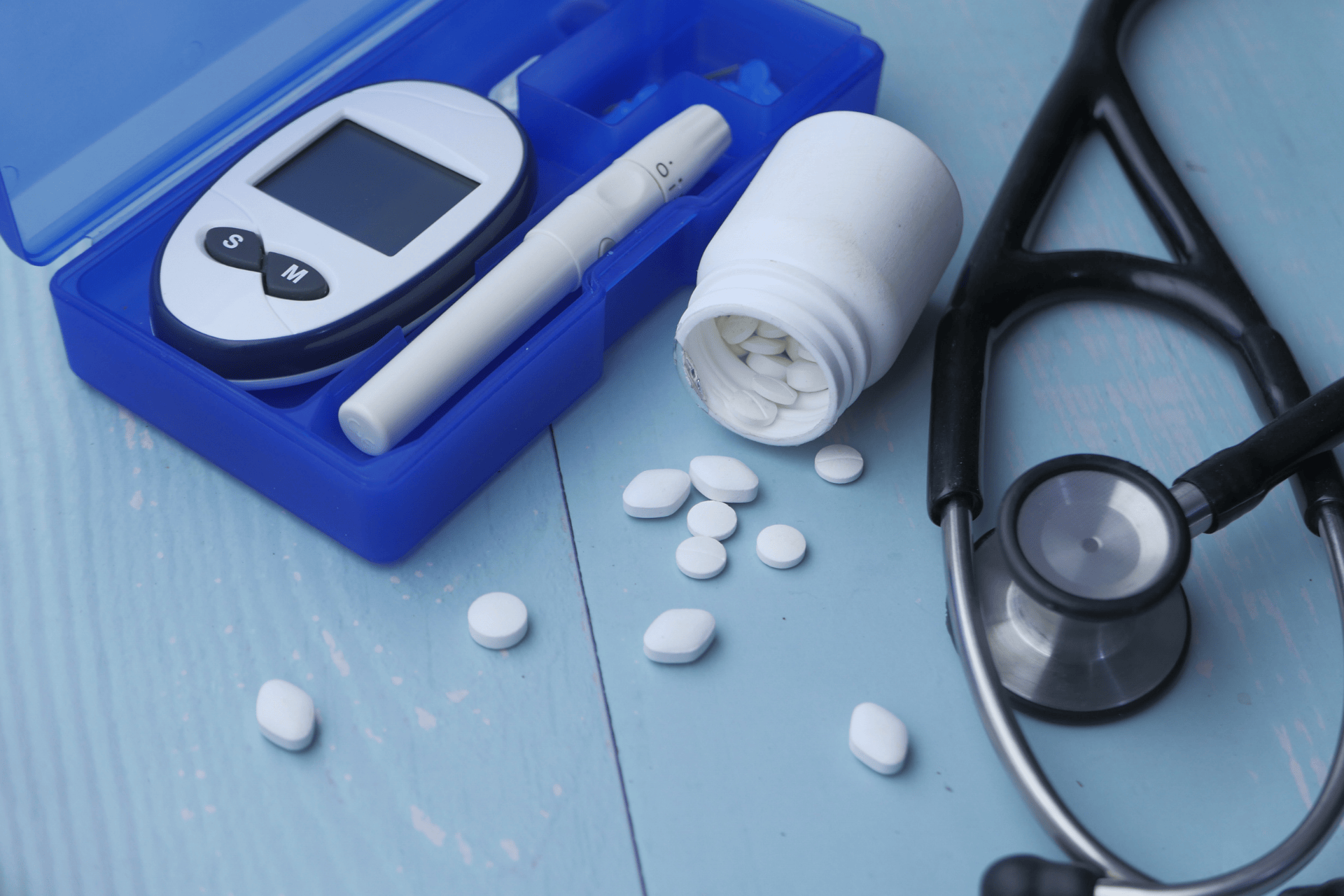Can You Drink Coffee While Taking Ozempic?
If you take Ozempic to manage your blood sugar, you might wonder if your daily coffee habit is safe. Coffee is a favorite morning boost for many, but when you add medications [...]
Read More
Medically reviewed by Alan Lucks | MD, Alan Lucks MDPC Private Practice - New York on November 19th, 2025.
Caffeine can raise blood glucose levels by 8-15% within 1-2 hours of consumption, requiring extra vigilance in diabetic patients using this medication.
Wait at least 30 minutes after your injection before drinking coffee to minimize gastrointestinal side effects like nausea and stomach upset.
Black coffee poses the lowest risk for blood sugar spikes—avoid adding sugar, flavored syrups, or high-carb creamers that compound glucose elevation.
Monitor your blood sugar more frequently on days you consume caffeine to identify your individual response pattern and timing sensitivity.
Seek medical attention if you experience persistent nausea, unexplained glucose swings above your normal range, or dizziness when combining the two.
If you take Ozempic to manage your blood sugar, you might wonder if your daily coffee habit is safe. Coffee is a favorite morning boost for many, but when you add medications like Ozempic to the mix, questions come up. This article will help you understand how coffee and Ozempic interact and what you should keep in mind to stay healthy.
Ozempic is a medication used to treat type 2 diabetes. It helps control blood sugar by mimicking a natural hormone called GLP-1. This hormone helps your body release insulin after eating, which lowers blood sugar. Ozempic also slows down digestion, which can help you feel fuller longer and may lead to weight loss. In addition to its primary function, Ozempic has also been shown to have cardiovascular benefits, reducing the risk of heart-related complications in patients with type 2 diabetes. This multifaceted approach makes it a valuable option for many individuals managing their diabetes.
Ozempic is administered via a once-weekly injection, which can be more convenient than daily medications. This ease of use can improve adherence to treatment plans, as patients may find it easier to remember a weekly routine rather than a daily one. Furthermore, ongoing studies are exploring the long-term effects of Ozempic, including its impact on weight management and overall metabolic health, which could provide even more insights into its benefits for those living with diabetes.
 Why This Matters for Coffee Drinkers
Why This Matters for Coffee DrinkersBecause Ozempic affects digestion and blood sugar, anything you consume, including coffee, can influence how well the medication works. Coffee contains caffeine, which can affect your body in different ways, especially if you have diabetes or are on medications like Ozempic. For instance, caffeine can lead to increased blood sugar levels in some individuals, potentially counteracting the effects of Ozempic. The acidity of coffee may impact gastric emptying, further complicating how the medication is absorbed and utilized by the body.
Moreover, the choice of what you add to your coffee can also play a significant role. Creamers, sweeteners, and flavored syrups can introduce additional sugars and calories that may affect blood sugar levels. Understanding how these components interact with Ozempic is crucial for coffee drinkers managing their diabetes. Some individuals may find that opting for black coffee or using sugar alternatives helps maintain better blood sugar control while still enjoying their morning ritual. This awareness can empower patients to make informed choices that align with their health goals while still savoring the pleasures of their favorite beverages.
Drinking coffee while taking Ozempic is generally safe for most people. There is no direct harmful interaction between coffee and Ozempic. However, caffeine can affect blood sugar levels in some individuals, so it’s important to monitor how your body responds. For those who enjoy their morning brew, it’s reassuring to know that they can still indulge, but they should remain vigilant about any changes in their glucose levels. Keeping a log of blood sugar readings before and after coffee consumption can help identify any patterns that may arise.
Caffeine can cause a temporary rise in blood sugar and insulin resistance in some people. This means your blood sugar might go up after drinking coffee, which could make managing diabetes a bit harder. If you notice your blood sugar spikes after coffee, consider cutting back or switching to decaf. It’s worth noting that the type of coffee you consume can also play a role; for instance, sugary lattes or flavored coffees can exacerbate blood sugar fluctuations. Opting for black coffee or using non-caloric sweeteners may be a better choice for those concerned about their blood sugar levels.
Since Ozempic slows digestion, drinking coffee right after taking your medication might cause stomach discomfort. Try to space out your coffee and Ozempic doses by at least 30 minutes to avoid nausea or upset stomach. Moreover, the timing of coffee consumption can also influence its effects on your energy levels and appetite. Some individuals find that having coffee before meals can help curb their appetite, while others may experience increased hunger. Experimenting with different timings can help you find what works best for your body and your diabetes management plan.
Incorporating coffee into your daily routine while on Ozempic should also involve considering your overall dietary habits. A balanced diet rich in whole foods, fiber, and healthy fats can help mitigate any potential spikes in blood sugar caused by caffeine. Pairing your coffee with a nutritious breakfast, such as oatmeal or a smoothie, can provide sustained energy and help stabilize blood sugar levels throughout the morning. Staying hydrated with water alongside your coffee can further support your body’s metabolic processes and enhance your overall well-being.
Limit added sugar: Sugary coffee drinks can raise blood sugar quickly.
Avoid high-fat creamers: These can add extra calories and affect digestion.
Try black coffee or use a splash of milk: This keeps your drink simple and diabetes-friendly.
Everyone’s body reacts differently. Keep track of how you feel after drinking coffee. If you notice jitteriness, stomach upset, or blood sugar changes, talk to your doctor or healthcare provider.
Caffeine can cause dehydration, so drink plenty of water throughout the day. Staying hydrated helps your body process medications like Ozempic better.
Frequent nausea or stomach pain after coffee or medication
Unexplained changes in blood sugar levels
New symptoms like dizziness or heart palpitations after caffeine intake
If you experience any of these, it’s a good idea to reach out to a healthcare professional. Telehealth services like Doctronic.ai offer quick access to doctors who can help answer your questions and adjust your treatment if needed.
 How Doctronic.ai Can Help You Manage Your Health
How Doctronic.ai Can Help You Manage Your HealthDoctronic.ai is a trusted AI-powered telehealth service that provides fast, accurate medical information and care. If you have questions about taking Ozempic or how coffee affects your health, you can visit Doctronic.ai for a free AI doctor visit anytime. This service draws on the latest medical research to give you clear answers in seconds.
For more personalized care, Doctronic.ai offers video visits with licensed doctors for under $40. These doctors can review your medications, discuss your coffee habits, and help you create a plan that works for your lifestyle. You can access this care 24/7 from anywhere in the United States.
Coffee is generally safe to drink while taking Ozempic, but watch how your body reacts.
Caffeine may raise blood sugar temporarily, so monitor your levels closely.
Space your coffee and Ozempic doses to avoid stomach discomfort.
Choose low-sugar, low-fat coffee options to keep your blood sugar steady.
Use telehealth services like Doctronic.ai for quick, reliable medical advice.
Coffee does not directly interfere with Ozempic, but caffeine or what you add to your coffee can affect blood sugar levels, which may influence how well your diabetes is controlled.
Decaf coffee contains little to no caffeine, so it may be a good option if you notice caffeine causes blood sugar spikes or stomach issues.
If coffee makes your nausea worse, try reducing your intake or switching to decaf. Talk to your doctor if nausea continues.
It’s best to wait at least 30 minutes after your Ozempic dose before drinking coffee to reduce the chance of stomach discomfort.
Coffee affects people differently. If you have heart problems, anxiety, hypertension, palpitations or stomach issues, check with your healthcare provider before drinking coffee regularly.
Most patients can safely enjoy coffee while on this GLP-1 medication with proper timing and glucose monitoring. Choose black coffee, wait 30 minutes post-injection, and track your individual blood sugar response to optimize your routine. If you're experiencing unusual symptoms or have questions about drug interactions, Doctronic can provide personalized guidance.
If you take Ozempic to manage your blood sugar, you might wonder if your daily coffee habit is safe. Coffee is a favorite morning boost for many, but when you add medications [...]
Read More